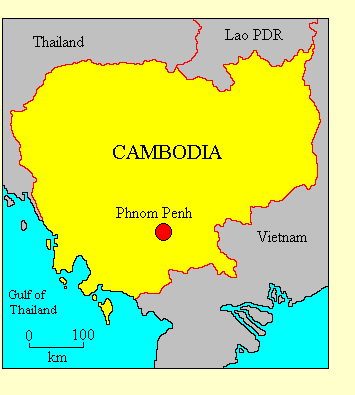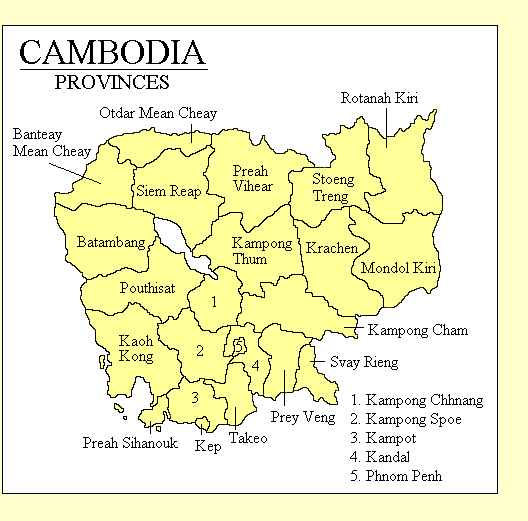

KINGDOM OF CAMBODIA
• Official name: Preahreacheanachakr Kampuchea (Kingdom of Cambodia)
• Location: South East Asia
• International organisations: Association of South East Asian Nations, Non-Aligned Movement,
Organisation Internationale de la Francophonie, United Nations
• Borders: Lao PDR, Thailand, Vietnam
• Coastline: Gulf of Thailand
• Land area: 181,040 Km2
• Population: 14,800,000
• Annual GDP (PPP) per capita: US$1,900 (2009 CIA estimate). World ranking: 155
• Ethnicity: Khmer 90%, Vietnamese 5%, Chinese 1%, other 4%
• Languages: Khmer is the official language and is spoken by 95% of the population.
Vietnamese is spoken by a small minority. French and English are used in business and media
in urban areas.
• Religion: Over 95% of the population are Buddhists. There are small Christian and
Moslem minorities.
• Form of government: Constitutional monarchy and, in theory, parliamentary democracy.
Cambodia is divided into 20 provinces and three cities.
• Capital: Phnom Penh
• Constitution: The Constitution of the Kingdom of Cambodia
came into effect on 21 September 1993.
• Head of state: King
Norodom Sihamoni came to the throne on 14 October 2004.

• Head of government: The Prime Minister, appointed by the King. The Prime Minister is the leader of the largest party in the legislature and is accountable to it.
• Legislature: Cambodia has a bicameral legislature, although only one house is elected. The
National Assembly of Cambodia (Radhsphea ney Preah Recheanachakr Kampuchea)
has 122 members, elected for five-year terms by proportional representation. The
Senate (Senat) has 61 members, appointed by the
king on the recommendation of the parties in the National Assembly.
• Electoral authority: The National Election Committee administers elections.
(Website currently under reconstruction.)
• Freedom House 2011 rating: Political Rights 6, Civil Liberties 5
• Transparency International Corruption Index: 21% (154 of 178 countries rated)
• Reporters Without Borders Press Freedom 2010 Index: 56.2% (128 of 178 countries rated)
• Heritage Foundation Economic Freedom 2010 Index: 57.9% (102 of 179 countries rated)
Political history
The Cambodian kingdom, heir to the once-great Khmer Empire, was in decline when the French arrived in the 1850s. In 1863
King Norodom asked the French to protect Cambodia from the Thais and the Vietnamese, and the
kingdom became a French protectorate. After the World War II Cambodia was reluctant to
give up French protection but the kingdom became fully independent in December 1954.
Norodom Sihanouk became King in 1941 at the age of 19. In 1955 he abdicated in order
to become Prime Minister, and he remained effective ruler of Cambodia until 1970,
pursuing a successful policy of neutralism during the Vietnam War. In 1970 he was overthrown by a
group of right-wing officers, who established the Khmer Republic with American support.
Sihanouk in exile formed an alliance with the Cambodian Communists, known as the Khmer
Rouges.

In April 1975 the Khmer Rouges captured Phnom Penh, and imposed a bizarre
regime of primitive communism, which murdered perhaps two million people and starved many
more. Sihanouk was nominally head of state but was in effect a prisoner. In 1978 Vietnam
invaded the country, overthrew the Khmer Rouges and installed a pro-Vietnamese Communist
regime. The
Khmer Rouges continued to resist the Vietnamese until 1991, when an agreement was signed
in Paris to draft a new constitution.
The 1991 settlement created a constitutional monarchy, with Sihanouk as King, with
an elected legislature. Free elections were held in 1993. The monarchist party FUNCINPEC (United National Front for an
Independent, Neutral, Peaceful and Cooperative Cambodia) won the election, but agreed to
share power with the allegedly reformed Communists, the
Cambodian People's Party (KPK), led by
Hun Sen.
In 1996, however, Hun Sen forced the FUNCINPEC leader, Prince Norodom Ranariddh, out
of office, and since then he has established an authoritarian regime behind a facade of
parliamentary rule. He won elections in 1998, 2003 and 2008, defeating both FUNCINPEC (which is almost extinct) and
the pro-democracy Sam Rainsy Party (KSR) (which has now inherited most of the
anti-government vote). Both Sam Rainsy personally and his party have suffered various forms of state
harassment.
Freedom House's 2011 report on
Cambodia says: "Cambodia is not an electoral democracy... Corruption and abuse of power are serious problems
that hinder economic development and social stability. Many in the ruling elite abuse their positions for private
gain... The government does not fully respect freedom of speech. Media controls are largely focused on local
broadcast outlets. There are many newspapers and private television and radio stations, including several
owned and operated by the CPP and opposition parties... Freedoms of association and assembly are respected by
the government to a certain degree, though the authorities' tolerance for these freedoms has declined over
the past two years... The judiciary is marred by inefficiency, corruption, and a lack of independence. There
is a severe shortage of lawyers, and the system's poorly trained judges are subject to political pressure from
the CPP.
Updated November 2011
|


